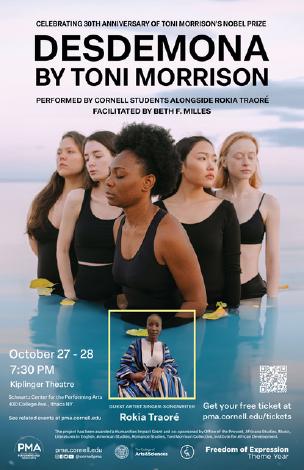Celebrating the 30th Anniversary of Toni Morrison’s Nobel Prize
A highlight at the Schwartz will be a staging of Cornell alum Toni Morrison’s theatre piece Desdemona Oct 27 & 28
Director Beth Milles writes,
We are thrilled to present Toni Morrison’s 2011 work Desdemona to honor the 30th anniversary of her Nobel Prize. Desdemona is a poetic response to Shakespeare’s Othello. It was originally created in 2011 by Morrison in collaboration with director Peter Sellars and singer-songwriter and activist Rokia Traore. It is an exploration of the complexities of this famous and historically challenging work.
Desdemona exists in the imaginary space of the afterlife interrogating the pain and healing process (and possibility) of forgiveness across generations- spaces and characters… Desdemona will include student performers onstage performing alongside Malian singer Rokia Traore. Morrison’s work is an evocation and a reflection — centering on human intimacy and presumptions and wounds relating to race — physical and spiritual violence-positing humility and humanity towards a space of forgiveness."
Genesis of Toni Morrison’s “Desdemona”
In a friendly argument between Toni Morrison and director Peter Sellars over lunch, Morrison refuted the director’s frustrated disparagement of Shakespeare’s Othello, assuring him that it was indeed a great play but “complicated.” The novelist contended that, with a re-imagining of certain aspects, not least the experience of the female characters, it was a valuable artistic work. Intrigued, Sellars’s challenged Morrison, promising that if she would write such a work, he would eagerly direct it.
The following is excerpted from the advance review of the first U.S. performance, in Berkeley, California (the play having first been formed in several European cities).
The Desdemona Project, a musical theater work, stems from seeds that Shakespeare planted within his text. In a sense, the project is Morrison's theatrical codicil, a new story which lets the murdered wife have the floor.
A largely overlooked line in Act IV of Othello has become the key ingredient in Morrison's play. Desdemona, who has already been threatened by her husband, sings a melancholic song and says, "I learned it from my maid, Barbary, who died while singing it from a broken heart."
"To use the name Barbary is a deliberate provocation," says Sellars. In 16th century England, Barbary meant Africa and so this line "leads you to this astonishing thing -- that Desdemona was raised by an African woman."
Morrison and Sellars interpret this iota of the character's backstory as a window into Desdemona's heart, a means to understand her in a deeper way; to understand her affinity with an African man. "She knows him," Sellars explains. Desdemona was raised by an African woman with African stories and African songs. "When Othello starts telling her stories, she knows those stories."
In The Desdemona Project, Morrison tells the stories that Othello had told Desdemona, the stories that, as she tells her father in Act I, made her fall in love with Othello. And we meet Barbary, Desdemona's maid. They meet on the other side of the grave.
Malian singer-songwriter Rokia Traoré sings the role of Barbary and has written the music for the production. An award-winning and acclaimed musician and singer, she and Morrison collaborated, exchanging text and song from New York to Mali and back, over the internet.
On stage, both Barbary and Desdemona get to say their piece. "Toni says, for the dead the past and future are the same," said Sellars. "So she let these women speak. Both retrospectively and also prophetically."
October 20, 2011

